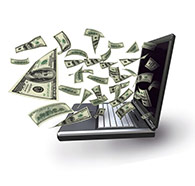НАВИГАЦИЯПОПУЛЯРНЫЕ СТАТЬИ
|
But it cautioned that the economic recovery remains "moderate and uneven," beset by greater uncertainty and a host of risks, including geopolitical tensions and financial volatility. In its flagship World Economic Outlook, the IMF kept its forecast for global growth this year at 3.5 percent. For 2016, the IMF expects global gross domestic product to expand 3.8 percent, up from the 3.7 percent it forecast in January. The headline figures mask a growing split among major economies, in part due to the varying impacts of currency fluctuations and lower oil prices. The sharp rise of the dollar against the euro and yen is expected to be a major theme at the meeting of the world`s top economic policymakers in Washington later this week. The currency moves have exposed some emerging economies as well. The IMF said monetary policies are driving most of the currency movements, as the U. S. Federal Reserve prepares to raise rates while the European Central Bank and Bank of Japan maintain their monetary stimulus. The currency effects should boost global GDP, supporting demand in the still-troubled economies of the euro zone and Japan, the IMF said, raising its forecasts for both regions. 16.04.2015 17:14 IMF worsens Russian economic outlook, GDP to fall 3.8% in 2015 The International Monetary Fund (IMF) now expects Russian GDP to fall 3.8% in 2015, compared with the 3% drop it was expecting in January, the IMF said in its latest World Economic Outlook Update. The IMF estimates the economy grew 0.6% in 2014. It thinks Russian GDP might fall 1.1% in 2016. The previous forecast was for 1% decline. The fall of Ukraine`s real gross domestic product (GDP) is expected to slow from 6.8 percent in 2014 to 5.5 percent in 2015, and it should recover in 2016 when it will rise by 2 percent, according to the World Economic Outlook. CIS economies as a whole might fall 1.4% in 2015 - this is 2.9 pp below the IMF`s previous forecast - and grow 0.8% in 2016, which is 1.7 pp below the previous forecast. Not including Russia, the CIS economies might grow 2.4% in 2015 and 4.4% in 2016, compared with previous forecasts of 4% and 4.6%, respectively. IMF noted the outlook for advanced economies was "improving”, while growth in emerging markets and developing economies was projected to be lower, primarily reflecting weaker prospects for some large emerging market economies and oil-exporting countries. The IMF left its forecast for the world economy, emerging markets and developed countries unchanged. 14.04.2015 14:50 Russia`s ruble: From down-and-out to darling What a week it`s been for Russia`s ruble - the currency that was in crisis in December has hit new highs against the dollar and euro to become this year`s best performer in foreign exchange markets. The ruble soared as much as 2 percent against the dollar on Friday to around 50.30, it best level since December. In addition, it jumped as much as 2.5 percent against the euro to around 53.40 per euro, a high for the year. Analysts said that a stabilization in the price of oil—a key export for Russia—plus relative calm in Ukraine and a perception that Russia`s economic outlook is not as bleak as feared help explain the rebound. "It came as a surprise for everyone, oil is a little higher and the main factor, but doesn`t explain the full extent of the rebound," said Liza Ermolenko, emerging market economist at Capital Economics. "The economy has not collapsed as many people expected, so this may also be a reason for the ruble`s recovery," she added. Russia`s economy, weighed down by sanctions and weak oil prices, is slipping into recession, but there are some signs of light on the horizon further ahead. Earlier this week, ratings agency Standard and Poor` upgraded its prediction for Russian economic growth in 2016 to 1.9 percent, from a previous forecast of zero growth. Ermolenko and other analysts added that the speed of the currency`s recovery from a crisis in December, when it lost over 30 percent of its value in just two days, has been somewhat unexpected. A fifth day of gains has put the ruble up almost 12 percent against the dollar so far this year – making it the best performing emerging market currency, analysts said. It`s also well ahead of major currencies such as the euro and Japanese yen, which are weaker against a broadly robust dollar. The U. S. dollar index, which measures the greenback against its peers, is up about 9 percent this year. 13.04.2015 17:20 S&P sees Russian economy growing 1.9% in 2016 Credit rating agency Standard and Poor`s expects the Russian economy to turn to growth in 2016, adding 1.9 percent. This comes as a sharp revision to the previous negative outlook. S&P analysts expect economic recession of 2.7 percent for Russia in 2015, RBC reported on Monday. The agency`s previous report assumed a GDP growth of 0.5 percent in 2015 and zero growth in 2016. The main premise which has changed the S&P`s outlook for Russian economy was the assumption on the oil price movement, S&P analyst Irina Veliyeva told RBC, adding that the rating agency forecasts an average price of $55 a barrel for 2015 and $70 per barrel over the next three years. The forecasts for GDP growth and other key indicators have been revised as Russia`s economy is dependent on oil prices, Veliyeva said. Meanwhile, there has been a general tendency of improving economic forecasts for the Russian economy. Last week, US bank JPMorgan forecast Russia`s GDP for 2015 would improve from a 5 percent fall to 4 percent. Economists from Russia and the US agreed last month that the Russian economy had already recovered from the worst. Inflation in Russia remains high and hit 16.9 percent annualized in March and 7.4 percent since the beginning of the year, according to Rosstat data. The head of the Central Bank of Russia Elvira Nabiullina said she expected inflation to go down to nine percent by next March. “We think the scenario of reaching a mid-term target to reach four percent inflation by 2017 is realistic,” she said. The Russian ruble, which is a key indicator for the country`s economy, has been doing better than Brent crude. Oil has played a much less prominent role in the ruble`s exchange rate in the first three months of 2015. The US-based S&P`s forecasts are close to those from Russian authorities. The Russian Ministry of Economic Development expects a 2.3 percent GDP growth in 2016 and 2.5 percent growth in 2017/2018.The Central Bank`s forecasts are less optimistic – a 3.5–4 percent decline for 2015 and positive 1–1.6 percent in 2016. Nevertheless, the CBR expects growth of 5.5–6.3 percent in 2017. 07.04.2015 16:09 WSJ Survey: Economists See Dollar Strength, Global Weakness Restraining U. S. Growth The surging dollar and a global slowdown are likely to restrain the U. S. economy through at least the first half of the year, according to The Wall Street Journal`s March survey of economic forecasters. Harsh winter weather is already slowing output in the current quarter. But even once that drag melts away, a wider trade gap will remain a headwind, the economists said. That could keep overall economic growth just below 3% in 2015. The panel of 63 economists,—not all of whom answered every question,—forecasts inflation-adjusted gross domestic product to clock in at a modest annual rate of 2.3% this quarter, little changed from the 2.2% pace of the fourth quarter of 2014. They expect much of the lost activity will be made up in the spring, allowing the economy to grow at a 3% pace in the second quarter. For the entire year, the economists think GDP will grow 2.9%. That would beat the 2.4% increase in 2014 and be fast enough to push the unemployment rate down to 5.1% by December from 5.5% in February, they said. 03.04.2015 17:07 World Bank sees protracted recession in Russia Russia faces a protracted recession as the impact of Western sanctions lingers and oil prices stay low, the World Bank said in a report. In its baseline scenario, the bank expected Russia`s gross domestic product to contract by 3.8 percent in 2015 and a further 0.3 percent in 2016, describing medium-term growth prospects as dim. The World Bank`s lead economist for Russia, Birgit Hansl, said "adjustment to the new oil price reality and the sanctions environment" was a key policy challenge. "If we look more into the medium term, the main challenge for Russia is the continued dearth in investment," she said, presenting the report. The bank`s latest forecasts are more pessimistic than those made in December, when it expected the economy to shrink by 0.7 percent this year and grow by 0.3 percent in 2016. The new baseline forecasts assume that the oil price will recover only marginally over the next two years, averaging $53 per barrel in 2015 and $57 per barrel in 2016, reflecting ample global supplies and moderate demand. Under a more optimistic scenario, with oil averaging $65.5 per barrel in 2015 and $68.7 per barrel in 2016, the economy would contract by 2.9 percent this year and grow by only 0.1 percent in 2016, the World Bank said. Its latest forecasts assume that sanctions imposed against Russia because of its role in the Ukraine conflict would stay in place in 2015 and 2016. 02.04.2015 17:34 Russian Economy Unexpectedly Expanded 0.4% in Fourth Quarter Russia`s economy unexpectedly grew in the fourth quarter before the full effect of the country`s currency crisis took hold. Gross domestic product expanded 0.4 percent from a year earlier after a revised 0.9 percent gain in the previous three months, the Federal Statistics Service in Moscow said on Wednesday, citing a preliminary estimate. That was above the median estimate for zero growth by 11 economists in a Bloomberg survey. Full-year GDP rose 0.6 percent in 2014, the service said, confirming its first assessment in January. The economy of the world`s largest energy exporter was grinding to a halt before an almost 50 percent crash in oil prices and the ruble`s worst crisis since 1998 brought Russia to the brink of a recession. Sanctions imposed by the U. S. and the European Union over the conflict in Ukraine cut off access to international markets and stoked capital outflows, forcing authorities to respond with spending cutbacks and an emergency increase in the benchmark interest rate in December. “The economy is gradually entering a recession,” said Vladimir Tikhomirov, chief economist at BCS Financial Group in Moscow. “It`s difficult to say when a reversal will happen. I expect that it may happen in the course of the coming three to six months.” A “one-time burst” of consumer demand in late 2014 may have supported growth, according to Tikhomirov. 31.03.2015 11:36 Economic Growth Cools As US GDP Expands 2.2%, Below Forecasts in Fourth Quarter Of 2014 U. S. gross domestic product, the broadest measure of goods and services produced across the economy, grew at a seasonally adjusted annual rate of 2.2 percent in the last three months of 2014, the Commerce Department said in its third and final estimate. The final revision missed economists` expectations for 2.4 percent annual growth, according to analysts polled by Thomson Reuters. The downward revision comes after economic growth smashed expectations in the third quarter after GDP grew 5 percent. Meanwhile, U. S. GDP increased 4.6 percent in the second quarter, after decreasing 2.1 percent in the first. The slowdown in growth comes as the U. S. Federal Reserve downgraded its GDP forecasts for this year. Annual U. S. gross domestic product in 2015 is expected to grow 2.3 percent to 2.7 percent, down sharply from the central bank`s estimate of 2.6 percent to 3 percent in December, the FOMC said in its economic projections following the central bank`s meeting last week. Economists expect first quarter growth to slow this year, driven by harsh winter weather and a downturn in U. S. business investment. Consumer spending, which accounts for nearly two-thirds of U. S. economic activity, fell in January despite a precipitous drop in gasoline prices across America. Spending declined 0.2 percent in January after falling 0.3 percent in December, the Commerce Department said earlier this month. 30.03.2015 15:49 China GDP growth to slow to 7.2% in 2015 The Asian Development Bank expected China`s economic growth may moderate to 7.2 percent this year and 7 percent in 2016 as the government targets slower rate and continues its program of structural reforms, the Manila-based bank said in a report. "China is likely to retain its position as the biggest contributor to the world`s economic growth in both 2015 and 2016," the bank said in its latest flagship annual economic publication Asian Development Outlook 2015. The projection was higher than the official growth target of around 7 percent set by the central government earlier this month at the annual session of the National People`s Congress. The bank said China`s economy could continue to deliver solid growth as long as the government makes steady progress on its reform agenda to elevate productivity. "There are natural forces for growth moderation such as a shrinking working-age population and rising labor costs," said ADB Chief Economist Shang-Jin Wei. "Deepening financial sector reform, such as reducing the dominance of state-owned banks and liberalizing interest rates while preserving financial stability, is key element of the needed reform package." China`s gross domestic product expanded 7.4 percent from a year earlier in 2014, with production growth slowdown in all sectors except agriculture. |
Цитата дняБольшинство людей начинают интересоваться акциями, когда все остальные интересуются. Время интересоваться — это когда никто другой не интересуется. Вы не можете купить что-либо популярное и выиграть от этого. |




 18.04.2015 13:10 IMF and World Bank: India`s economic growth likely to outpace China in 2015 India`s economic growth clip this year and next will be better than previously assumed, overtaking China in 2015 to become the world`s fastest growing major economy and widening the gap further in 2016, the International Monetary Fund (IMF) and the World Bank have said in separate forecasts. Both IMF and World Bank see India`s growth rising to 7.5 per cent in 2015 from 7.2 per cent in the preceding year, but have different assessments for 2016. IMF, which last January forecast 2015 growth at 6.3 per cent and 2016 growth at 6.5 per cent, has penciled in 7.5 per cent growth next year while World Bank has the 2016 figure higher at 7.9 per cent. The bank had last January pegged the growth rates at 6.4 per cent this year and 7.0 percent in 2016. The numbers will be music to the government`s ears, especially because the Indian economy, while being spoken of in the same breath as China in terms of economic potential, has never managed to surpass its giant neighbor`s growth rate. Even with a higher growth rate, India`s $2-trillion GDP will remain much smaller compared with China`s $10-trillion economy. IMF has pegged China`s growth at 6.8 per cent in 2015 and 6.3 per cent next year while the world economy is forecast to show no material improvement, growing only 3.5 per cent compared with 3.4 per cent in 2014. World Bank sees China growing at 7 per cent in the next two years. 17.04.2015 10:52 IMF says currency shifts support global economic growth Recent shifts in exchange rates should help the global economy, boosting Japan and Europe in particular, amid increasing divergence in the growth paths of the world`s major economies, the International Monetary Fund said. The Washington-based institution kept its global growth forecasts unchanged, with faster economic expansion in the euro zone and India expected to be offset by diminished prospects in other key emerging markets such as Russia and Brazil.
18.04.2015 13:10 IMF and World Bank: India`s economic growth likely to outpace China in 2015 India`s economic growth clip this year and next will be better than previously assumed, overtaking China in 2015 to become the world`s fastest growing major economy and widening the gap further in 2016, the International Monetary Fund (IMF) and the World Bank have said in separate forecasts. Both IMF and World Bank see India`s growth rising to 7.5 per cent in 2015 from 7.2 per cent in the preceding year, but have different assessments for 2016. IMF, which last January forecast 2015 growth at 6.3 per cent and 2016 growth at 6.5 per cent, has penciled in 7.5 per cent growth next year while World Bank has the 2016 figure higher at 7.9 per cent. The bank had last January pegged the growth rates at 6.4 per cent this year and 7.0 percent in 2016. The numbers will be music to the government`s ears, especially because the Indian economy, while being spoken of in the same breath as China in terms of economic potential, has never managed to surpass its giant neighbor`s growth rate. Even with a higher growth rate, India`s $2-trillion GDP will remain much smaller compared with China`s $10-trillion economy. IMF has pegged China`s growth at 6.8 per cent in 2015 and 6.3 per cent next year while the world economy is forecast to show no material improvement, growing only 3.5 per cent compared with 3.4 per cent in 2014. World Bank sees China growing at 7 per cent in the next two years. 17.04.2015 10:52 IMF says currency shifts support global economic growth Recent shifts in exchange rates should help the global economy, boosting Japan and Europe in particular, amid increasing divergence in the growth paths of the world`s major economies, the International Monetary Fund said. The Washington-based institution kept its global growth forecasts unchanged, with faster economic expansion in the euro zone and India expected to be offset by diminished prospects in other key emerging markets such as Russia and Brazil. Автор:
Автор: 
 Комментарии: 0
Комментарии: 0 Просмотров: 23
Просмотров: 23


